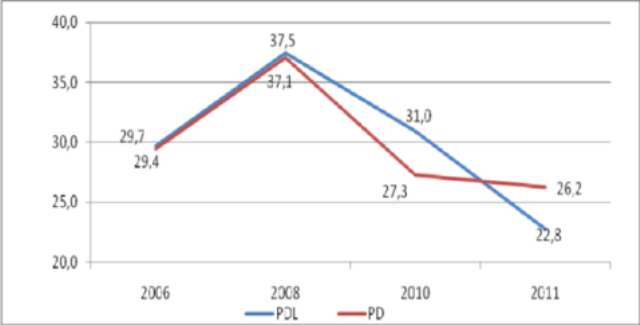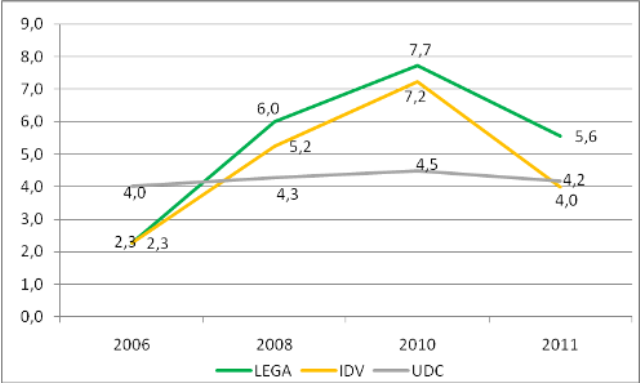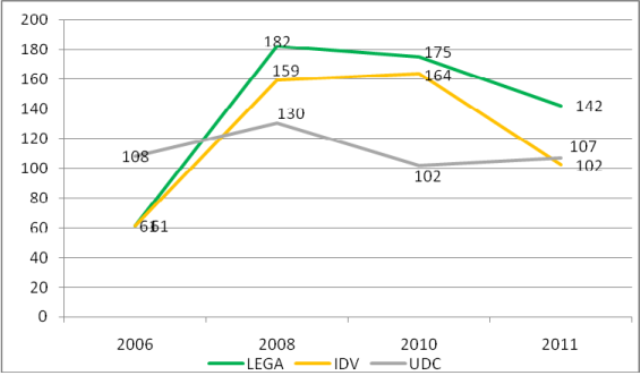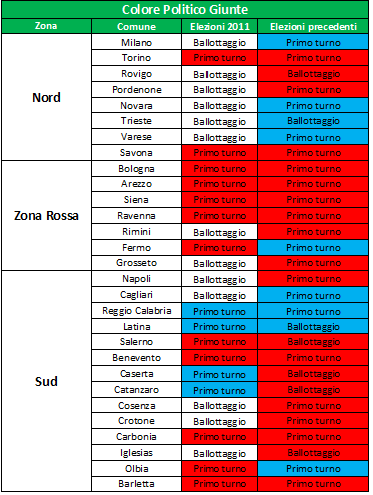di Vincenzo Emanuele e Aldo Paparo
Le elezioni comunali del 15 e 16 Maggio sono state una prova importante per testare lo stato di salute dei due maggiori partiti italiani, il Pd e il Pdl. Risulta pertanto interessante confrontare il risultato elettorale complessivo ottenuto da queste due forze politiche in queste elezioni con quello delle tornate precedenti. Per effettuare un raffronto omogeneo tra i dati abbiamo preso in considerazione solamente i risultati dei 23 comuni capoluogo nei quali si è votato anche alle regionali del 2010 (i quattro capoluoghi sardi e i due del Friuli-Venezia Giulia vengono pertanto eliminati dal computo).
La Figura 1 presenta l’andamento di Pd e Pdl in valori percentuali nei 23 comuni capoluogo. Si nota come, dopo la sostanziale parità fra i due partiti sia nelle comunali 2006 che nelle politiche 2008, la forbice si allarga a favore del Pdl di poco meno di 4 punti alle regionali del 2010. In queste elezioni il quadro si rovescia completamente, ed è il Pd a sopravanzare il Pdl di 3,4 punti divenendo così il primo partito del paese nei comuni considerati. Tutto questo avviene nel quadro di un trend generale che vede i due grandi partiti sempre meno capaci di raccogliere quote significative dell’elettorato italiano: nel 2008 insieme raccoglievano il voto di 3 italiani su 4, tre anni dopo sommati sono sotto al 50%: un italiano su due ha scelto di affidarsi ad altri.

FIG.1: I due partiti maggiori, dati percentuali.
La Figura 2 è la stessa della precedente, ma i dati sono espressi in valori assoluti, cioè rappresentano i voti validi espressi in migliaia. E’ chiaro che ragionando in termini di dati assoluti il grafico risulta influenzato dai livelli di affluenza, più alti alle politiche del 2008 e più bassi alle regionali del 2010. I due partiti passano così da oltre 1 milione e centomila voti a testa raccolti nel 2008 ad un milione e duecentomila voti in due nel 2011: in pratica, complessivamente, il loro consenso si è dimezzato in termini assoluti. Rispetto al dato percentuale, troviamo altri elementi interessanti. Il crollo del Pdl tra 2010 e 2011 osservato nei valori percentuali (-8,2 punti) risulta di gran lunga ridimensionato (“appena” 118.000 voti in meno), mentre il Pd che in percentuale risultava in leggera flessione (-0,9 punti), in cifre assolute cresce (+ 54.000 voti). Così per entrambi, il vero tracollo elettorale appare avvenuto tra politiche e regionali, con il Pd che perde oltre mezzo milione di voti e il Pdl che ne perde più di quattrocentomila.

FIG.2: I due partiti maggiori, valori assoluti (migliaia di voti).
Le elezioni comunali del 15 e 16 Maggio sono state un banco di prova importante anche per le ambizioni degli altri tre unici partiti (oltre a Pdl e Pd) presenti in Parlamento. Come per i due maggiori partiti, abbiamo effettuato un confronto dell’andamento di queste forze politiche nei 23 comuni capoluogo al voto (ancora una volta sono stati esclusi i comuni delle due regioni, Sardegna e Friuli-Venezia Giulia che non hanno votato nel 2010) fra le comunali del 2006 e quelle della settimana scorsa. La Figura 3 descrive i risultati dei partiti in termini percentuali mentre la Figura 4 presenta i valori assoluti dei voti raccolti.

FIG.3: I partiti minori in Parlamento, dati percentuali
Dai grafici emerge innanzitutto l’andamento molto regolare, quasi piatto, della spezzata grigia, quella dell’Udc. Il partito di Casini oscilla attorno ai 4 punti percentuali tra il 2006 e il 2011, con il picco del 4,5 alle scorse regionali. Guardando ai valori assoluti la situazione cambia, ma solo leggermente: lo scudocrociato riceve sempre poco più di centomila voti validi, ma questa volta la vetta è rappresentata dai 130.000 del 2008 (ancora una volta precisiamo che sui dati in valore assoluto incide il livello di affluenza alle urne, più alto alle politiche 2008 e più basso alle regionali 2010). Insomma l’esperimento del Terzo Polo, assai negativo ad esempio per il risultato di Futuro e Libertà, non è stato molto costoso per l’Udc, anche se dobbiamo precisare che il partito ha ottenuto i risultati migliori quando si è alleato con il centrodestra.

FIG.4: I partiti minori in Parlamento, valori assoluti (migliaia di voti)
Contro ogni previsione, i partiti che hanno perso di più in queste elezioni sono l’Italia dei Valori e la Lega. Il partito di Di Pietro ha visto ridursi i margini di manovra per via dell’accresciuta concorrenza nell’area che si colloca a sinistra del Pd: Vendola e soprattutto di Grillo hanno pescato nel suo stesso elettorato. Il Partito dell’ex Pm interrompe bruscamente il trend ascendente che lo aveva portato dal misero 2,3% delle comunali 2006 al 7,2% delle scorse regionali: scende al 4%, cedendo oltre 3 punti. In termini assoluti perde oltre 60.000 voti, il 37,8% del suo elettorato nel 2010: in pratica, quasi 4 elettori su 10 dall’anno scorso a oggi hanno lasciato l’Idv.
La Lega Nord ha pagato il momento non felice del governo Berlusconi, giunto ai 3 anni di legislatura, e quindi al teorico massimo punto di down nel consenso dell’intero ciclo elettorale. Per la prima volta, infatti, ad una perdita di voti del Pdl non è seguita una parallela crescita leghista, come era accaduto in passato. La Lega deve assistere suo malgrado alla cosiddetta fine della “terza ondata” (Biorcio 2008, 68): dopo il boom di fine anni ’80 e quello, storico, del 1996 (10,1% alle politiche), dal 2008 il suo andamento era in costante crescita (dal 2,3% del 2006 al 7,7% del 2010). In queste comunali la Lega non va oltre il 5,6% nei 23 comuni capoluogo, perdendo così oltre 2 punti. Ragionando in termini assoluti il partito cede 33.000 voti rispetto alle regionali e 40.000 rispetto alla vetta dei 182.000 voti delle politiche.
